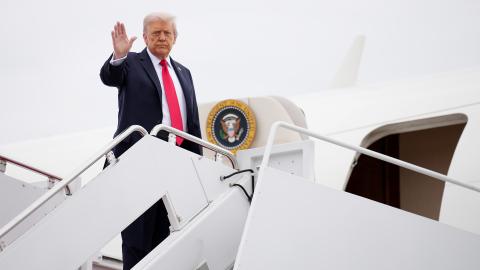Over the past eight months, it has become clear that on foreign policy, the biggest contrast between the Trump administration and the Biden administration is their respective attitudes toward American power. Note that the actual power capabilities of the United States did not change with the transition. Rather, it was the willingness to assert American power that increased dramatically—as was sorely needed.
The Biden administration’s liberal internationalist “values-driven foreign policy” saw the United States as playing a global leadership role in creating and preserving a “rules-based international order” with which US national interests need not conflict. The Biden administration’s values emphasized process and the pursuit of agreement about the rules needed to achieve the level of cooperation and multilateral engagement that, according to liberal internationalism, will lead to global stability. American power was at best a backdrop for these aspirational endeavors, and more often than not, it was seen as an inconvenience or even an outright impediment.
Ironically, this aversion to American power resulted in a world far less hospitable to the very rules the Biden administration wanted to see followed. More alarming, it put American interests squarely in jeopardy. The fiasco of the Afghanistan withdrawal was as flagrant a show of powerlessness as the United States has put on since the fall of Saigon, made all the more horrific by the senseless loss of 13 American servicemembers. This impotence undoubtedly emboldened Vladimir Putin in weighing his decision to invade Ukraine, after which the Biden administration’s support for Ukraine was timid, heavy on rhetoric while light on military value, for fear of Russian escalation. Thus, the brutal stalemate continues today.
While happy to convene “summits for democracy” and needlessly castigate allies for failing to embrace progressive policy preferences, the Biden administration appeased and coddled repressive regimes like Iran and Venezuela but spurned the Iranian and Venezuelan people who were desperately fighting for their unalienable rights. And rather than recognizing China as an adversary and taking sufficient actions to deter the threat, the Biden administration clung naively to hopes that it could convince Beijing to be a responsible global actor. Under the Biden administration, the United States, though not actually weak, consistently acted as if it were.
In stark contrast, the Trump administration has little reservation about flexing and deploying American power. Rather than the chaotic images of Kabul, we now saw American B-2 stealth bombers fly untouched into the heart of Iran and deal a devastating blow to its nuclear program. After declaring, quite correctly, that Venezuelan strongman Nicolás Maduro was not only an illegitimate dictator but also the head of a narco-terrorist organization that partnered with China, Russia, and Iran to threaten American interests, the Trump administration deployed a guided missile cruiser, attack submarines, destroyers, and amphibious vessels reportedly containing a Marine expeditionary unit just off the Venezuelan coast. In response to the Trump administration’s threats to take back the Panama Canal in response to growing Chinese influence over this critical choke point for open sea lines of communication, Panama agreed to withdraw from China’s Belt and Road Initiative. President Donald Trump’s insistence that European allies spend more on defense paid off following Putin’s full-scale invasion of Ukraine in our allies’ realization that European security must be their primary concern.



















